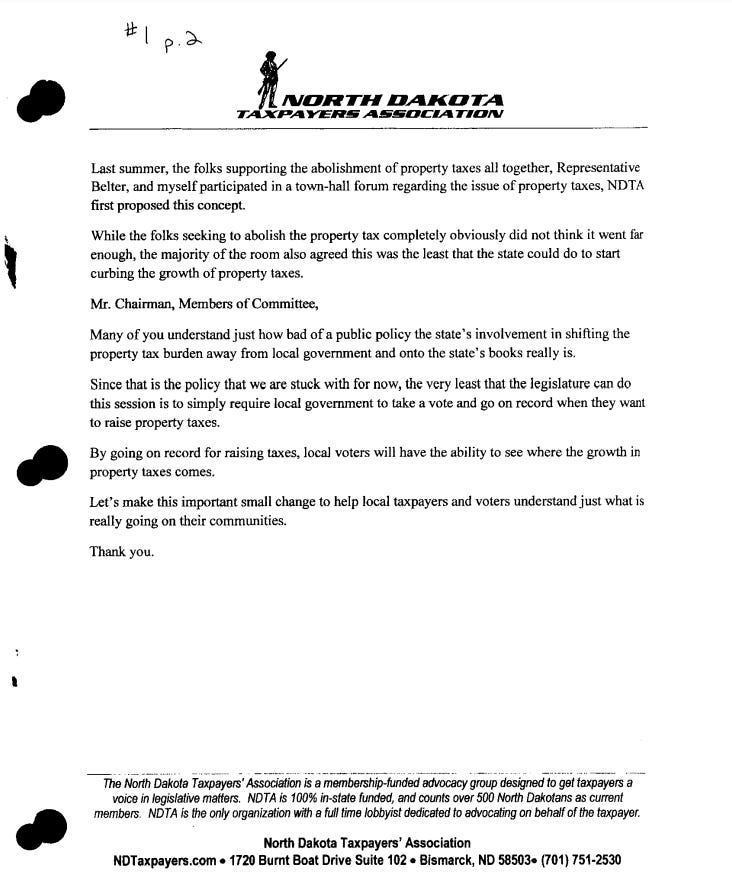For as long as I’ve been involved, the discussion about the interaction between mill levies and the valuation process has been at the heart of the property tax debate, yet something legislators have never been able to pull themselves into changing.
During his State of The State address, Governor Burgum stated
“We understand and share the concerns about property taxes. And we’re happy to sit down with anyone and discuss ways to actually reduce property taxes – not subsidize them with state spending that only encourages local "spending and grows local government.” - Governor Doug Burgum (Page 20)
There have been many ideas thrown out over the years on this issue.
Back in 2012, the Grand Forks Herald ran OpEd I wrote offering up a solution at that time under the assumption that the effort that year to abolish property taxes entirely would fail.
Taxing Unrealized Capital Gains
The fundamental problem with the way that property values interact with the mill levy is that every year there is an increase of tax revenue demanded on the Unrealized Capital Gains associated with the property increasing in value one year to the next.
Taxing unrealized capital gains is a policy that fundamentally deters investment in general. It is why investment accounts in stocks and bonds do not tax the assets until there is a transaction that generates profits.
In fact, taxing unrealized capital gains is such bad policy, the IRS has a special process for investors to move in and out of similar property and avoid getting penalized called the “Section 1031 Swap”.
So even the IRS understands it is bad policy that hinders investment to tax assets until they are truly liquidated into profits.
Other states like California back in the 1970s passed measures like Prop 13 to only re-assess property value upon sale. While this solved the immediate problem, it created other problems (like a shortage of housing causing to hyperinflation of home values to new buyers).
There have been attempts to address this in North Dakota, but they have not gotten too far.
The History Of Trying To Remedy Automatic Property Tax Increases
Back in 2011, there was legislation that originally attempted to mitigate the Automatic Property Tax Increase generated by property values going up.
House Bill 1194 sought to remedy this problem by requiring a vote of local government officials to increase budgets and end Automatic Tax Increases.
The principle behind this concept was that "when values go up, mill levies must come down." Local government could no longer ride the AUTOMATIC PROPERTY TAX INCREASES. Local government could still raise their budgets by taking a vote, but they would have to go on record doing so, rather than just letting the valuation inflation do it for them.
That bill was waterered down to being simply a notification law if mill levies were going to increase at all.
Here is the documented history of HB 1194 in 2011, below is the testimony I submitted at that time on that issue.
Lack of Uniformity In The Assessment Process
For many years, there has been an understanding that the assessment process statewide is not uniform even though state laws dictate the process.
Every locality does it slightly differently, and it’s the role of the Equalization process that determines whether the methods and results are within the constrains of what the law allows.
One part of the issue that aggrivates many property owners is the use of For-Profit private property tax assessment companies in this process. I wrote about this issue all the way back in 2011 (the links may not work due to the age of the article).
The state has basically allowed local governments to out-source their obligations to this company under the assumption that the company is “independent”. However, the company has made its reputation on being able to elevate the assessed value base for taxing jurisdictions.
Every few months, there will be a story from a community up in arms about getting re-assessed by this company. It generates bad blood between citizens and their local officials.
The question always comes down to: should a private company be in charge of performing this government responsibility?
Where HB 1248 in 2023 Comes Into Play
In the video above, you can watch the discussion over HB 1248.
The following is the written testimony I provided the committee in support of this study bill.
What Is The “Pennsylvania Land Value Tax”?
In the video discussion, when asked about the original language this study trying to target a system based more on land size than the property value, I referenced the fact that is sort-of like what is called the Pennsylvania Land Value Tax.
It is one of many concepts that have been tried in various places. It’s not necessarily a silver-bullet to the problem of assessment, but it may be a piece of it - just like all the other concepts.
Conclusions
There are dozens of ideas that could be tried to get toward reforming property taxes. They have all been talked about and studied before. Someone does need to compile all these studies and ideas, and process through the stacks of material available.
Perhaps Governor Burgum should create a position for a Property Tax Reform Czar - someone who has a handle on how property taxes work, how the current policy came to be, what has been tried in the past, and what can be tried in the future. Someone that can then coordinate with legislators and committees to come up with ideas to try.
And I used the word TRY intentionally. Some of these ideas may work, some may not. But until we try something and see what happens, we will never really know.
Talking about it for several more decades won’t get us anywhere.











Share this post